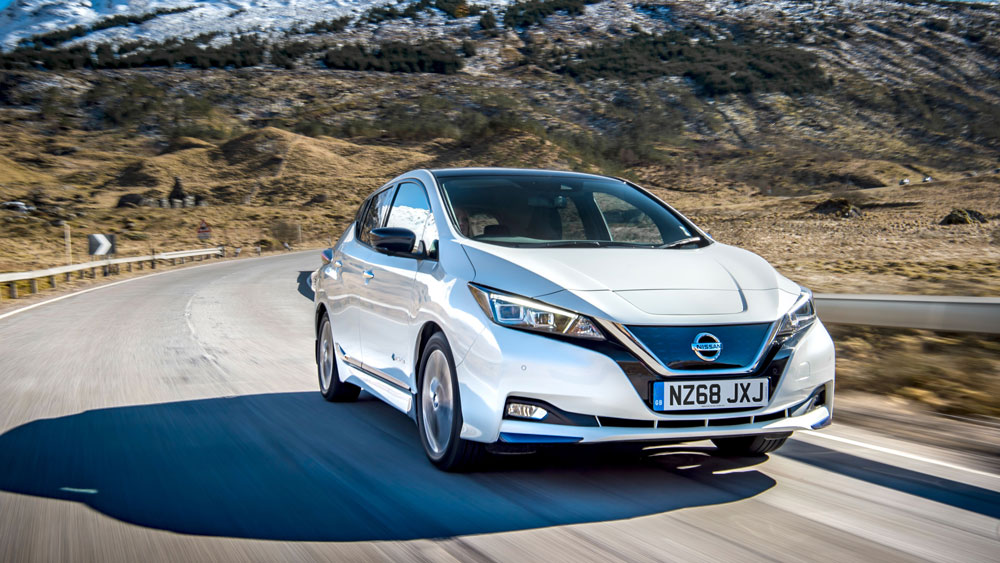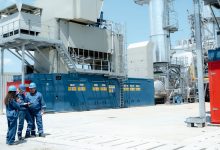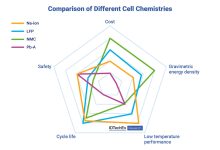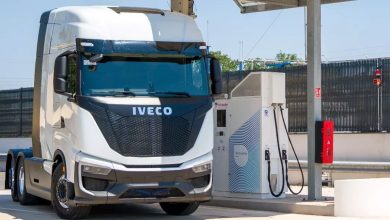EDF Energy and Nissan partner to advance low carbon transport
- Partnership to explore combining Nissan second-life electric vehicle (EV) batteries with EDF Energy’s demand side response platform, PowerShift.
- Millions of second-life EV batteries could be used to supply electricity to the grid and cut Britain’s carbon emissions.
- Agreement also covers future collaboration across smart charging, batteries, decentralised generation and grid integration over the coming years.
The UK’s largest producer of low-carbon electricity and one of Britain’s leading car manufacturers are joining forces to work together on a number of projects that will support the adoption of electric vehicles and energy generation and storage solutions.
Nissan and EDF Energy, the manufacturer’s long-term UK supplier, signed the new agreement in Paris on October 10. The partnership will kick off with a first of its kind collaboration to explore how second-life Nissan electric vehicle (EV) batteries can support demand side management.
Both EDF Energy and Nissan have been at the forefront of developing the market for electric vehicles in the UK and will bring substantial technical expertise to the wide ranging agreement that will support the transition to low carbon transport, such as smart charging, batteries, decentralised generation and grid integration.
The first joint project will see the partners explore the business case for recycling retired batteries from Nissan LEAF into commercial battery storage. The system would see electricity stored in the batteries and released back to the grid using EDF Energy’s PowerShift to react quickly to demand side response (DSR) initiatives. Storage systems offer a lower carbon solution compared to relying on coal and gas power stations to meet peaks of electricity demand on the grid.
The combined system will be trialled to see how it can support on site generation, greater control and flexibility over energy use, and provide additional revenue streams.
Already this year, there are more lithium-ion batteries being installed in electric vehicles than into consumer electronics and demand for electric mobility is only expected to increase, equating to millions of used electric vehicle batteries being available for the energy storage market. These batteries have as much as 70 per cent of their original capacity and will still have more than 10 years of remaining life.
“The transition to Electric Vehicles provides huge opportunities for businesses and households, which is why we are investing in the best technology and products to help consumers and business realise the associated benefits. In partnering with Nissan, we’re excited to explore new technologies and business models to make low carbon transport a reality now and for the future,” Béatrice Bigois, Managing Director of Customers at EDF Energy, said.
“We are delighted to be entering this partnership, which will see Nissan’s Intelligent Mobility strategy continue to support the expanding electric vehicle market and help create a more sustainable energy future in the UK. We believe electric cars are just the start, and our second life programme ensures batteries from our cars continue to provide energy storage capacity in other applications – in houses, businesses, football stadiums even – long after their life in cars. It’s an exciting prospect and we look forward to working closely with EDF Energy on these developments in future,” Francisco Carranza, Director of Energy Services, Nissan Europe, mentioned.
This partnership comes as EDF President Jean-Bernard Lévy detailed the Group’s strategic plans on electric transport this morning, including its plan to be the leading energy company for EVs by 2022 across its four largest European markets: France, the United Kingdom, Italy and Belgium.
About EDF Energy
EDF Energy is the UK’s largest producer of low-carbon electricity, meeting around one-fifth of the country’s demand and supplying millions of customers and businesses with electricity and gas.
It generates electricity with eight nuclear power stations, more than 30 wind farms, one gas and two coal power stations, as well as with combined heat and power plants.
EDF Energy is leading the UK’s nuclear renaissance with the construction of a new nuclear power station at Hinkley Point C. This will provide low carbon electricity to meet 7% of UK demand. The project is already making a positive impact on the local and national economy, British industry, as well as boosting skills and education. EDF Energy also invests in a range of low carbon technologies including renewables and battery storage. It is applying research and development expertise to improve the performance of existing generation and developing the potential of new technologies.
The company provides gas and electricity for more than 5 million customer accounts and is the biggest supplier of electricity by volume in Great Britain and the largest supplier to British businesses. It offers innovative energy systems for commercial customers and digital innovation for customers at home. EDF Energy has also launched its own innovation accelerator, Blue Lab, which focuses on making customers’ lives easier.
The Better Plan is EDF Energy’s framework for being a sustainable and responsible energy business and is an integral part of EDF’s 2030 vision to be the efficient, responsible electricity company, and champion of low-carbon growth. The Better Plan is underpinned by comprehensive environmental and social programmes which have been recognised by a wide range of organisations.
EDF Energy is part of EDF Group, the world’s biggest electricity generator. In the UK, the company employs around 13,000 people at locations across England and Scotland.







